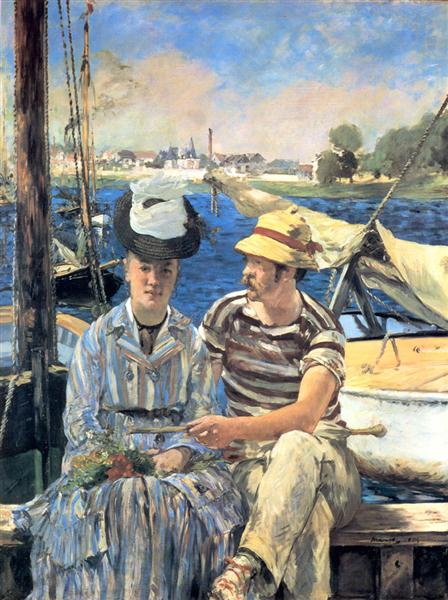Beskrivelse
Arbeidet "Argenteuil - 1874" av Édouard Manet er innskrevet i en avgjørende periode med kunsthistorie, der maleren går inn i styring av lys, farge og representasjon av landskapet, og slår sammen tradisjonen med innovasjoner med innovasjoner av impresjonisme. Manet, anerkjent som en av forløperne for denne bevegelsen, tilbyr oss i dette maleriet et panorama som kondenserer dets interesser i modernitet, dagligliv og behandling av lys i naturen.
Sammensetningen presenterer en scene av et landskap som viser den ikoniske havnen i Argenteuil, en forstad til Paris som ble et populært reisemål blant impresjonistene. Arbeidet fanger solens glød på vannet, mens stearinlyset flyter stille og antyder en atmosfære av ro og ro. Disponering av elementene i tabellen gjenspeiler en tilnærming til balanse og harmoni, der skip og menneskelige skikkelser okkuperer den sentrale delen og de mest tydelige flyene, i motsetning til den mest diffuse bakgrunnen, og understreker dybden og vitaliteten i det naturlige miljøet.
Bruken av farger i "Argenteuil - 1874" er verdt å nevne. Manet bruker en lys palett, rik på nyanser av blått, grønt og hvitt, som fremkaller sollys og dens interaksjon med vann. Gjennom løse og energiske penselstrøk gjenspeiler kunstneren bevegelsen av vann og den livlige atmosfæren på stedet. Denne fargen og lysbehandlingen etablerer ikke bare den visuelle konteksten til arbeidet, men resonerer også med den emosjonelle effekten naturen kan ha på betrakteren.
Når det gjelder karakterene, selv om de ikke er hovedfokuset, blir tilstedeværelsen av menneskelige skikkelser på stranden observert som vitner om denne sommerens roen. Disse silhuettene, ofte uskarpe, ser ut til å være representasjoner av en middelklasse på jakt etter rekreasjon, en refleksjon av datidens sosiale liv og fremveksten av fritidskultur i Frankrike fra det nittende århundre. Manet, inkludert disse figurene, introduserer en følelse av identitet og tilhører det naturlige miljøet, og beriker dermed fortellingen om verket.
Manet inviterer også betrakteren til å tenke på forholdet mellom menneske og natur, et sentralt tema i mange av hans verk. Dette søket etter forbindelsen med miljøet er parallelt med arbeidet til andre moderne impresjonister som utforsket det samme landskapet, for eksempel Claude Monet, som også dedikerte flere verk til Argienteuil. Imidlertid kjennetegnes Manets tolkning ved hans mest direkte tilnærming og hans raffinerte lysoppfatning, der uttrykk og følelse ikke bare oppstår fra landskapet, men fra menneskelig interaksjon med dette.
Til slutt er "Argenteuil - 1874" ikke bare et vitnesbyrd om Manets talent, men også en refleksjon av en periode der kunst begynte å frigjøre seg fra akademiske konvensjoner. Arbeidet er impregnert med en atmosfære som skildrer essensen av tid og sted, men også fanger også dynamikken i en epoke i transformasjon, der impresjonisme viste vingene og utfordret de tradisjonelle forestillingene om kunst.
Dette maleriet står derfor som en kilometer. I "Argenteuil - 1874" blir betrakteren invitert til å oppleve denne symbiosen på en måte som overskrider tiden, og bærer med seg en takknemlighet fornyet av den flyktige skjønnheten i livet.
KUADROS ©, en berømt maling på veggen din.
Håndlagde oljemalerier, med kvaliteten på profesjonelle kunstnere og den særegne forseglingen til KUADROS ©.
Bilder reproduksjonstjeneste med tilfredshetsgaranti. Hvis du ikke er helt fornøyd med kopien av maleriet ditt, refunderer vi pengene dine 100%.

